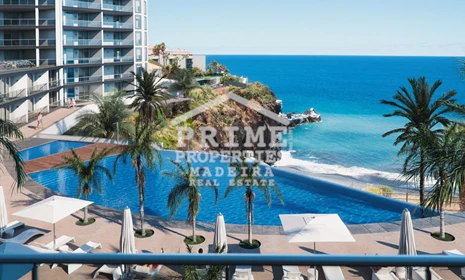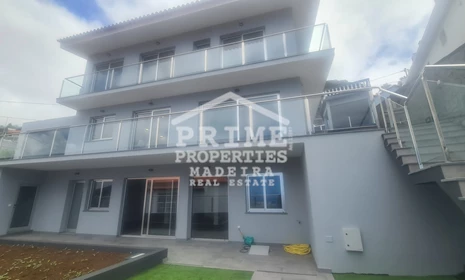Procedures
If there’s a place to come and celebrate life, then that place is Madeira.
However buying property in Madeira is all about location, location, location.
Madeira is a beautiful and fascinating island that makes for a wonderful holiday home retreat. The island comprises of stunning natural scenery, with massive mountains, jagged cliffs, lush forests and delightful flower gardens. The people of Madeira are welcoming and hospitable, which reflects the laid-back and generous nature of the Portuguese. The island is safe (crime is virtually non-existent), has European standards, comforts and values, while providing exceptional value for money.
Madeira has an international airport and this provides direct flights to the majority of Europe. Madeira has enticed the low cost airlines to fly to the island and this has significantly reduced the cost of flights, with very cheap tickets available if purchased well in-advance.
Most fees are based on the fiscal value (valor tributável) of the property, which is usually much lower than the actual price paid.
Most taxes are paid by the buyer.
The different steps needed to take when buying a property in Portugal are described below:
The 'Simplex' Government Program
Since January 2009 the Portuguese government is implementing a reform called SIMPLEX designed to cut the bureaucracy, modernise the public services and lower the administrative burden on companies and citizens.
Various reforms are already implemented, such as the Law nº 116 – 2008 by which Notaries (Notários), Lawyers (Advogados), Bailiffs (Solicitadores), Chambers of Commerce and Industry (Câmaras de Comercio e Indústria) and Registry Offices (Serviços de Registo) have now the competence to deal with, witness, check and control the legality of the acts and contracts of any real estate or mortgage transaction.
Land registry, payment of taxes or additional formalities were also simplified thanks to an online service called “Casa Pronta”. “
STEPS OF PURCHASE
• Selection of an independent qualified lawyer.
• Obtaining a fiscal number through a professional fiscal representation company.
• Down payment of a part of the agreed price in order to take the property off the market.
• The lawyer will then collect all the house documents to check that everything is in order. If applying for a Portuguese mortgage it is advisable to obtain an offer from the bank before the Promissory Contract is made.
• Promissory Contract is drawn up by the buyer's lawyer and signed by the seller and the buyer. If using a bank to finance the purchase, it is recommended that the contract be made for 90 days until the deed of purchase.
• The Final deed is made in the presence of a competent entity to legalise the deed the seller, the buyer (both can be represented lawyer, with a power of attorney) and a bank representative (in case of financing with a mortgage).
• Registration of the deed at the National Land Registry Records (Conservatória do Registo Predial).
COSTS INVOLVED WITH THE PURCHASE
PROPERTY TRANSFER TAX
Permanente Resident (Residing at least 183 days in Madeira)
- 127.396,25€- 0 0,00
127.396,25€ - 174.265€ X 2% - 2.547,93€
174.265€ - 237.607,50€ X 5 % - 7.775,88€
237.607,50€ - 395.965€ X 7 % - 12.528,03€
395.695€ - 791.816,25 € X 8 % - 16.487.67€
791.816,25€ - 1.378,650€ - 6%
+ 1.378,650€ - 7.5%
Holiday Home
+127.396,25€ X 1%
127.396,25€ - 174.265€ X 2% - 1.276,96€
174.265€ - 237.607,50€ X 5 % - 6.501,91€
237.607,50€ - 395.965€ X 7 % - 11.254,06€
395.695€ - 759.410 € X 8 % - 15.213,71€
759.410€€ - 1.378,650€ - 6%
+ 1.378,650€ - 7.5%
Legal Fees
Lawyers Fees (Between 500€ and 1% of the purchase price)
Promissory Contract
The Promissory Contract sets out the terms of the transaction such as the identity of the owner, a detailed description of the property and land boundaries, registration and tax numbers, purchase price, deposit and date of completion.
Usually, the contract is signed within 30 days from the date of reservation. At this stage the purchaser would normally be expected to pay a deposit, which is negotiable (between 10% and 30% is common practice).
In Portugal, the parties become contractually bound with the signature of this Promissory Contract of Purchase and Sale (Contrato de Promessa de Compra e Venda), which sets out the terms of the transaction: property details, price, method of payment, completion date, warranties, penalties, etc.
Until such contract is signed the vendor is not committed and can change his mind. It is useful to remember that conditional clauses can be added in the promissory contract in order to protect you from events being out of your control and to prevent you to lose your deposit. For example: Obtaining a mortgage or obtaining a planning permission and a building licence.
· Deposit: If the buyer decides to withdraw from the sale, he will lose the value of the deposit. If it is the case of the vendor, he will reimburse the buyer from the value of his deposit and pay a compensation which is usually equal to the amount of the deposit.
· Required Documents:
· Final Check: Just before signing the final deed, it is important that you do a final check to ensure that the property is still in the same state than when you negotiated it with the seller.
· Deed (Escritura)
If you have applied for a bank loan, you will need to register the mortgage at the National Land Registry Records (Conservatória do Registo Predial) along with the provisory registration of the acquisition.
Then, and upon payment of the transfer tax (IMT), you will be ready to sign the Deed (Escritura).
It will be signed before a competent entity to legalise the deed
The competent entity will verify the identity of the parties and the validity of the deal, both legally and from a tax point of view. This is the document that gives the purchaser the proper title to the property. Registering your new home is the most important act of buying a property in Portugal because ownership will be enforceable against third parties only after after being registered at the National Land Registry Records (Conservatória do Registo Predial).
BUYING OFF PLAN
Buying a new property still at the planning stage is becoming increasingly popular in Portugal as it provides the purchaser a hefty discount and spread the payment during the construction process.
Advantages:
· Buying at a discount with payments spread over the duration of the construction.
· By the time the property building is finished it is likely that its value increased resulting immediately in profit.
· Being newly built, maintenance and/or renovation costs are expected to be minimal.
· Being one of the first buyers in a new development usually offers the opportunity to select among the best properties in terms of location, sun orientation or unique features.
· Some promoters will let the buyer customise the property during the construction process.
·
Disadvantages:
· Market could fall during construction time making rental or re-sale difficult.
· The delivered property may not be quite as expected.
· Construction deadlines might slip.
· The developer might enter bankruptcy.
Purchase process
There are usually four basic steps:
· Reservation. The buyer will be asked to pay a deposit (usually 10 per cent) is required. The contract must contain:
o timetable for the property’s completion
o payments timeframe (i.e.: completion of the structure 20%, completion of the roof 20%, completion of the interior 20%, final completion 20%)
o penalties for non-completion, guarantees for building work, details of the builder’s insurance policy (acting as a non-completion guarantee)
o copy of the plans and drawings
o a clause withholding a part of the payment (i.e.: 10%) during a certain amount of time (usually 6 to 12 months) as a warranty against building defects detected after entering the property.
· Building completion: when construction work is finished.
· Legal completion: when the balance of the purchase price is paid.
BUILDING YOUR DREAM HOME
Building a new home is a long process and requires preparation before you start the construction. Many topics should be thoroughly analysed in order to avoid costly mistakes.
Budget
First, you must determine how much you can spend and to evaluate the whole construction cost. If you need a mortgage, check with a financial institution the amount of the loan, its length and your financial capacity to pay it back.
The land
When both the land and the floor plans have been selected you will need to insert the plan into the chosen lot in order to create the fit. Bear in mind that the configuration of rooms, the placement of windows, the location of the driveway and many other design elements will be affected by the plot you build on.
Another important aspect is that you will have to respect the building regulations of the region. You will also need to investigate factors such as soil condition, drainage and the medium term infrastructure plans for the region (PDM).
At the municipality, you need to check:
· The Municipal Master Plan (PDM – Plano Director Municipal) which is defined every 10 years and define the areas and new infrastructure development to be build.
· The percentage of construction you can build on the plot and the possible existence of other building restriction.
The floor plan
You can ask an individual architect to custom-design your house based on your own specifications or use stock plans from a catalogue which meet your needs. A custom designed-house is created specifically for your family at your own taste but will be more expensive to build. When taken from a stock plan, the builder can make small modifications in room size, style or other details at minor cost.
Team of professionals selection
A good way to select an architect (arquitecto), a builder (construtor) or any other professional, is asking the local people who you can trust or owners of properties in the area.
· A topographer, to confirm the plot’s boundaries as well as its declivity.
· An architect or a home designer, to design or adapt the floor plans. If you want to confirm that your architect is fully licensed, you can check it at the Architects Association.
· An engineer for the supervision of the specialised specialised works (soil stability, electricity, gas, sewage, waste water, telecommunications, thermal and acoustic behaviour of the building.)
· A general builder for the house construction.
· A surveyor to ensure that the builder does his work according to the plans and specifications.
The Contract
A written contract signed by the buyer, the builder and the architect is mandatory. It includes a detailed description of the project (Caderno de Encargos) and a copy of all the subcontracted contracts (electricity, sewage, ...).
Any alteration to the project should be done in written form, signed and annexed to the contract. Remember to read the entire contract and to have all questions answered. Never pay more than what is stated in the contract. It is wise to have a clause in the contract withholding during 6 to 12 months after completion, a part of the total payment (usually 3% to 5%) as a warranty to ensure that the builder will fix all building defects encountered during that period.
The builder should present an insurance contract which covers the buyer in case of his bankruptcy or in case of non completion of the building.
The contract should contain:
· The contractor's full name, address, telephone number, and professional license number (Nº de Álvara) which can be checked through the National Building & Real Estate Institute (IMPIC).
· A detailed description of the work to be done specifying the materials to be used: quality, quantity, weight, colour, size, brand name, etc.
· The starting and completion dates.
· Final quotations (orçamentos) of the subcontractors with all costs discriminated.
· How, how much and when payments are to be made.
· A penalty clause for late completion.
· Any warranties and guarantees of workmanship.
· The description of cleaning and debris removal at the end of the construction.
· The designation of a court of arbitration in case of dispute.
·
Administrative authorisations, licences and inspections
The project and the special works (stability, electricity, gas, sewage, waste water, telecommunications, thermal and acoustic behaviour of the building) have to be submitted to the local municipality which has the authority to grant the approval of the project and the authorisation to proceed with the construction (Licença de Óbras) but has to forward the special works to the relevant entities for approval.
The different steps are:
· Application for a water and sewerage connection to the SMAS (Serviços Municipalizados de Àgua e Saneamento).
· Application for electricity connection to EDP (Electricidade de Madeira).
· Application for telephone connection to PT (Portugal Telecom).
· Inspection by the water and sewerage authority.
· Inspection by the power authority.
· Inspection by the telecommunication authority.
· Water and sewerage connections.
· Electricity connection.
· Telephone connection.
· Final inspection to obtain the Municipality Habitation Licence (Licença de Habitação).
· Registration of the building at the National Land Registry Records (Conservatória do Registo Predial).
Guarantees
Under Portuguese law, builders are responsible for small defects during one year after completion and five years for structural defects.
Final steps
After completion, the builder should request the Municipality Habitation Licence (Licença de Habitação) confirming that the local authority (Câmara Municipal) has inspected the property and that it complies with planning permission and building regulations. The property should be inspected as well by the tax office (Serviço das Finanças) to fix its value for future payment o Property Transfer Tax (IMT) and Capital Gain Tax when being sold. The property should also be registered at the National Land Registry Records (Conservatória do Registo Predial).


